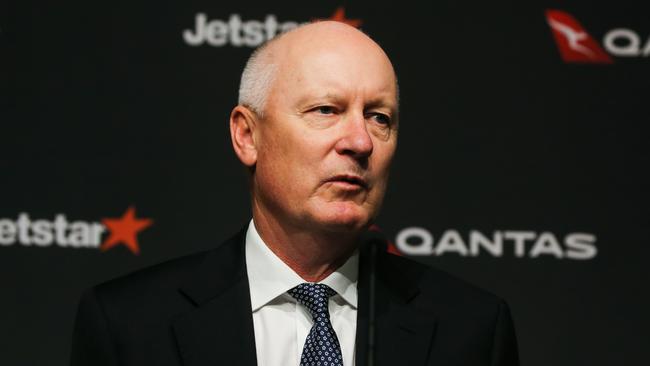Qantas pilots join calls for chairman Richard Goyder to go
Qantas pilots have added their voice to calls for chairman Richard Goyder to stand down, saying they have lost all confidence in him and his board of directors.
Qantas pilots have added their voice to calls for chairman Richard Goyder to stand down, saying they have lost all confidence in him and his board of directors.
As Qantas announced more spending on “customer initiatives” in an effort to rebuild the airline’s reputation, the Australian and International Pilots Association said Mr Goyder must go.
AIPA president Tony Lucas said they had written to Qantas CEO Vanessa Hudson informing her of the pilots’ position in a first for the association.
“Richard Goyder has overseen one of the most damaging periods in Qantas history which has included the sacking of 1700 workers, allegations of illegally marketing cancelled flights and a terribly managed return to operations after Covid-19,” Mr Lucas said.
“The morale of pilots has never been lower. We have totally lost confidence in Mr Goyder and his board.”
He said pilots did not believe the culture reset so desperately needed at Qantas was possible while Mr Goyder remained chairman.
“Despite overseeing the destruction of the Qantas brand, Mr Goyder last week accepted a nearly $100,000 pay rise, taking his pay to $750,000, while staff are expected to accept a two-year wage freeze,” he said.
“This is a galling and tone-deaf decision.”
Qantas denied Mr Goyder received any pay rise, pointing out his income included travel entitlements of $117,000 up from $27,000 the previous year.
AIPA’s move followed similar calls from the Australian Licensed Aircraft Engineers Association and the Transport Workers Union, urging Mr Goyder to leave.
In an effort to move on from recent controversies, last week Ms Hudson issued an apology to customers and admitted the airline group had disappointed and frustrated many of its clients.
The video message was followed up on Monday by a commitment to further spending to address customer “pain points” on top of $150m already earmarked.

An extra $80m would help fund more training and resourcing of call centres, more frequent flyer redemptions and reviews of longstanding customer policies and the quality of in-flight catering.
Adam Glezer of Consumer Champion wondered why Qantas would need to spend significant funds on reviewing policies when it was “quite obvious where the problems lay”.
“I can tell them at no cost where they’re being unfair, and that starts with holding onto $570m of consumer money (in Covid travel credits),” Mr Glezer said.
“Cancelling flights at the last minute as well as lengthy delays, has also caused customers a great amount of grief.”
Frequent flyer Tony Rothwell was hopeful the review would include the booking site – after he had $188 deducted from his credit card for an “unsuccessful” Qantas Hotel booking.
He said after making the booking, paying and getting an online confirmation, he received an email to say it was unsuccessful and he would have to contact Qantas to get a refund.
“I tried their ‘live chat’ but that was unavailable. Contact centre was only available to help in business hours. Then the next day it took ten minutes on the phone to be told the amount would be refunded but it might take ten days,” Mr Rothwell said.
Food has also been a sore point for some Qantas customers, since the airline ramped up travel at the same time as taking $1bn worth of costs out of the company.
A public campaign by environmentalist John Dee saw Qantas reintroduce vegetarian options to domestic economy passengers last year, but there was ongoing angst about the standard of meals.
On a recent Brisbane-Singapore flight, a passenger was horrified by the “inedible” chicken dish she was served, followed by a paddle pop worth about 50c.
Concerns continued around flight delays and cancellations with latest on-time performance data showing Qantas axed more flights than Jetstar in August.
Four per cent of services were cancelled in the month, or 849 flights, compared to 2.9 per cent of Jetstar flights (202 services).
Virgin Australia’s cancellation rate was even higher at 4.9 per cent or 596 services, while Rex recorded a low 1.8 per cent, after axing 113 flights throughout the month.
Cancellations were highest on the Canberra-Sydney route with almost 15 per cent of QantasLink flights scrapped, compared to 3.8 per cent of Virgin flights.
Canberra Airport CEO Stephen Byron said the high rate of axed flights was a “national disgrace” and warranted government attention.
“The federal government can’t stand by and condone this anymore,” Mr Byron said.
“They should ban all Qantas executive bonuses for the next 12 months until they get cancellations under control.”
A market update by Qantas indicated the extra spending on customer initiatives, plus a $200m increase in the airline’s fuel bill would not be added to airfares but funded from profits.
Qantas noted its financial position remained strong with the airline expecting to fly around 4 million passengers over the current school holiday period, up from 3.7 million at the same time last year.
A statement observed that travel continued to be a “top spending priority among Qantas frequent flyers” ahead of entertainment, renovations and homewares.
Qantas shares closed down 8c at $5.23 on Monday, the lowest in almost a year.








To join the conversation, please log in. Don't have an account? Register
Join the conversation, you are commenting as Logout